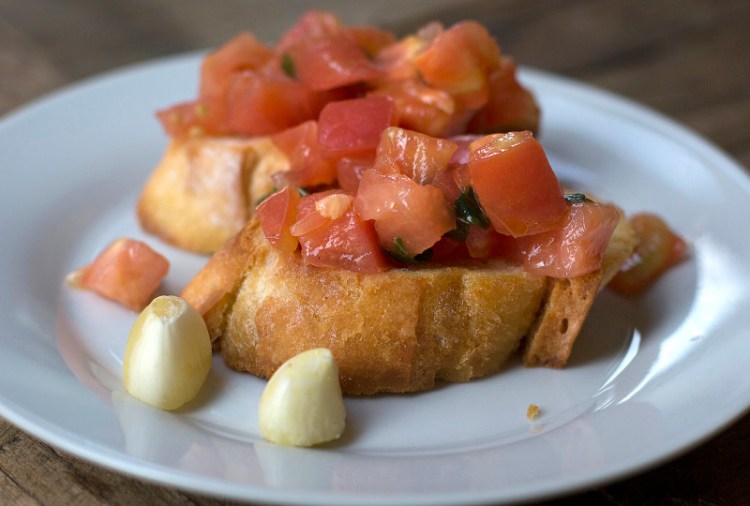First things first: Bruschetta should be pronounced “broo-sketta,” not “broo-shetta.” My colleagues on the Slate Culture Gabfest recently had an interesting discussion about how to pronounce foreign words in domestic contexts, and I generally agree with Slate editor-in-chief Julia Turner that you should make an effort to get the vowel sounds mostly right. In this case, though, getting the vowels mostly right is not enough. If we agree that the “ch” in chianti and chiaroscuro is a hard C — and I think we can all agree on that — then we ought to be consistent by pronouncing the “ch” in bruschetta as a hard C as well.
But that hard C is the hardest thing about bruschetta, which is toast, basically. Toast with stuff on it. Italian restaurants have done their best to convince us that bruschetta is an elegant appetizer for special occasions, but you can make bruschetta for a crowd at home in 10 minutes flat, using ingredients that cost less than $10. (I bought everything I needed to test this recipe, save the olive oil, at a Whole Foods in Manhattan for $8.76. There aren’t many things you can get at a Whole Foods in Manhattan for $8.76.)
Classic bruschetta with olive oil, garlic, tomato, and basil is a wonderful foodstuff with only one drawback: It can hurt your mouth when you eat it. Between the rough texture of the toasted bread and the piquancy of the raw garlic that’s traditionally rubbed on it, bruschetta can make the top of your mouth feel like it’s been scoured with steel wool. Yes, as Michael Stipe memorably yowled, everybody hurts, but there’s no need to hurt while you’re eating bruschetta. To forestall pain, it’s important to slice the bread thickly, so there’s plenty of fluff in the middle of each slice, and to toast it (or, more traditionally, grill it) conservatively so it doesn’t turn rock-hard. You want bread that’s golden brown, not deeply charred. It also helps to drizzle excess tomato juice on the toasted bread to soften it up.
If your tomato doesn’t have excess juice, you should be concerned. Bruschetta is one of those dishes that is only as good as the sum of its parts: If you don’t start with a decent tomato, you won’t have decent bruschetta. That nightshade should be heavy and soft, and it should smell tomato-y. The quality of your bread and olive oil matter, too. Whether you use baguette, focaccia, ciabatta or some other Italian loaf, it should come from a bakery, not a grocery-store aisle. And I rarely wax lyrical about good olive oil, but you should make a point of using an assertive, fruity extra-virgin oil in this dish.
Tomato and Basil Bruschetta
Makes: 4 to 6 servings
1 baguette or Italian loaf, cut into 1-inch slices
4 tablespoons extra-virgin olive oil
1 pound tomatoes, roughly chopped
2 tablespoons fresh basil in chiffonade (stack leaves, roll them up and slice thinly, crosswise, as if you were slicing a loaf of bread)
Salt and black pepper
1/2 large garlic clove
1. Heat the oven to 450 degrees F, or heat a charcoal or gas grill. Brush the bread slices on both sides with 3 tablespoons of the olive oil. Bake them on a baking sheet or grill them, turning once, until they’re golden brown, about 5 minutes.
2. Meanwhile, put the tomatoes, the basil, and the remaining 1 tablespoon olive oil in a medium bowl; season with salt and pepper, and toss to combine.
3. When the bread has cooled enough to handle, rub the top of each slice with the cut side of the garlic half. Top the bread with the tomato mixture, and serve warm.
Send questions/comments to the editors.



Comments are no longer available on this story